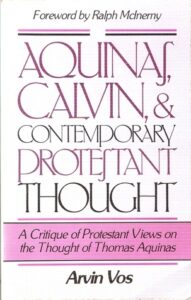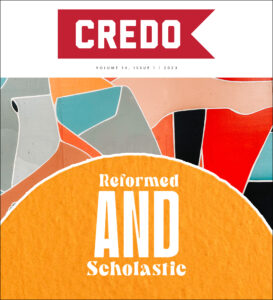Vos’s A quinas, Calvin, and Contemporary Protestant Thought sounded the trumpet for a Protestant recovery of Thomas. In 1985, Vos’s jeremiad sought to remove many misconceptions surrounding Thomas, and although his work received positive reviews at the time, it seemed to do little in his day to change these tenacious misconceptions of Thomas. But perhaps his work tilled the ground for the contemporary retrieval of the Angelic Doctor.
quinas, Calvin, and Contemporary Protestant Thought sounded the trumpet for a Protestant recovery of Thomas. In 1985, Vos’s jeremiad sought to remove many misconceptions surrounding Thomas, and although his work received positive reviews at the time, it seemed to do little in his day to change these tenacious misconceptions of Thomas. But perhaps his work tilled the ground for the contemporary retrieval of the Angelic Doctor.
Vos shows, rather convincingly, that there are cracks in the foundation. He calls for an ad fontes approach to Thomas that seeks to understand his precise language and context to determine if Thomas can offer anything to Protestants, particularly those of the Reformed tradition. Vos compares Thomas and Calvin on the nature of faith to accomplish this goal. Vos believes that, though there are differences between these two theologians in method and vocabulary, their positions are more similar than previously thought.
In Chapters one and two, Vos compares Calvin’s definition of faith with Thomas’s account. He posits that the difference between the two lies in the different meanings of the term “knowledge.” What Calvin calls “sure knowledge” is essentially what Thomas calls “firm belief.” Vos argues that Calvin’s attack on implicit faith as blind adherence to the church is not an attack on Thomas’s view but rather against Lombard and the Schoolmen of Calvin’s day.
In Chapters three through five, Vos evaluates contemporary Protestant views of Thomas. Have Protestants understood Thomas’s view of natural and philosophical theology? Did late medieval scholasticism interpret Thomas’s ideas correctly? How should Thomas’s Five Ways be understood within the context of faith? In these chapters, Vos argues that a careful reading of Thomas reveals that Protestant scholarship has been uncharitable or ignorant of Thomas’s writings.
In Chapter six, Vos examines Thomas on nature and grace. He clarifies Thomas’s position, not as a two-story dualism, but rather that grace is essential and preeminent over nature. Thomas does not hold to two separate ends of man, a natural one and one in accord with grace, but rather, one ultimate end of man: the vision of God. This ultimate end can only be reached through grace; it was later medieval scholastics that portrayed grace as a superfluous add-on.
Finally, Vos ends his work with a call for a new appreciation of Thomas within Protestant and Reformed circles. Thomas is their heritage, and Vos would not have them despise this heritage out of ignorance or faulty scholarship. Vos writes, “It is high time that Protestants put the old division behind them, high time they began to reclaim this part of their heritage – and they can rightly claim Aquinas as part of their heritage” (174).
Vos presents a thorough examination of Thomas. He shows that not only is it essential that scholars interact with the original sources, but they must also understand the original vocabulary. So much of the contemporary misunderstanding of Thomas stems from a failure to grasp what Thomas means by the language that he is employing. This is not to say that there are no differences between Thomas and Protestants. Still, Vos encourages that a more accurate assessment of Thomas will see him as an ally rather than an opponent on many issues. So much of the contemporary misunderstanding of Aquinas stems from a failure to grasp what Thomas means by the language that he is employing. Click To Tweet
Vos makes a compelling case for Protestants to take Thomas seriously. By showing the lines of similarity between Thomas and Calvin, Vos shows that the supposed divide is narrower than previously imagined. Both Calvin and Thomas agree that faith is grounded in God’s own self-revelation. They both warn against blind adherence to the church that places more confidence in church leaders than in God, and though they used different vocabulary, they affirmed a state of incomplete faith that is insufficient for salvation because it is not moved by love. Vos also shows that many of Thomas’s categories are drawn from Augustine. Most modern Protestants would not think of rejecting Augustine, yet are quick to dismiss Thomas. Vos draws this connection to warn Protestants of the inconsistency of lionizing one and disregarding the other.
Vos is charitable to modern interpreters of Thomas, giving their arguments ample attention. He demonstrates careful scholarship and refuses to fall into strawman critiques. He critiques like a friend seeking to show a better way forward. Perhaps if Protestants revisit their misconceptions concerning Thomas, they would find formidable help in their engagement with contemporary issues. Many of Thomas’s critics are concerned that he allows Aristotle’s categories to dictate theology, but Vos shows that Thomas used the philosophical categories to help distinguish when helpful, but in no way did he Christianize the whole of the Philosopher. It is one thing to say Thomists after Thomas went too far and quite another to judge Thomas based on the views of late medieval Thomists. Such slippery slope arguments hinder fruitful contemporary scholarship.Perhaps if Protestants revisit their misconceptions concerning Thomas, they would find formidable help in their engagement with contemporary issues. Click To Tweet
Though some have criticized Vos’s work for being overly repetitive, this reviewer appreciated his frequent summaries. These summaries helped codify Vos’s arguments and keep the reader engaged with the book’s thesis. These repetitious sections help to provide needed reminders for those unfamiliar with Thomas’s language and distinctions.
Vos’s book is not without weaknesses. First, the chapter in which Vos seeks to prove that Thomas was a fideist is a mixed bag. Vos acknowledges that Thomas’s unique categories defy the particular definitions he uses of “fideist” or “evidentialist.” Nevertheless, in his attempt to correct the misconception of Thomas on faith and evidence, he still attempts to press him into this modern mold. Regardless of whether one believes Vos succeeds in his attempt to prove Thomas is a fideist, this chapter clarifies that Thomas’s conclusions are not as black and white as some contemporary Protestants make them.
Second, Vos states that “There are fundamental differences between [Thomas and Calvin] in method and vocabulary, but at some points, their positions are very similar, and where they differ I would like to suggest that Aquinas’s view is occasionally superior” (xii.) Nevertheless, Vos does little to show the differences between these two theologians and how Thomas might have had superior views. Perhaps this work would have been strengthened by articulating these differences and showing that Thomas is still an ally despite these differences.
Regardless of these weaknesses, Vos’s book, along with other secondary sources, can help the average reader grasp the language of Thomas to understand the Summa better. Nearly forty years after the publication of Aquinas, Calvin, and Contemporary Protestant Thought, Protestants are hearing Vos’s call and mining the riches of Thomas. Thanks, in part, to early scholars like Vos, the sons of the Reformation are reclaiming their heritage and are better because of it.


